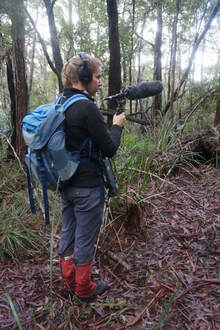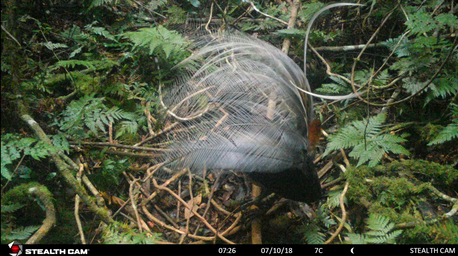Fiona Backhouse
- Postdoc, Lab of Ornithology, Cornell University & Lab of Animal Ecology, University of Western Sydney
- Topic: Cultural evolution in lyrebirds
- Contact: Fiona Backhouse
|
Bio
I have a passion for broad-scale ecological interactions, and in particular I enjoy understanding how physical features of the environment affect the behaviour and life history of organisms. I received a Bachelor of Science from the Australian National University in 2016, completing Honours on the role of environmental heterogeneity on the reproductive success of superb fairy-wrens (Malurus cyaneus). In this project I used GIS to map long-term records of territory boundaries and nest sites and to link this data to fine-scale habitat characteristics. Following this, I spent several months working as a field assistant in Scotland, first on blue tits (Cyanistes caeruleus) near Edinburgh, then on Soay sheep in the remote St Kilda archipelago. In addition to this I have a long-standing background in music with classical training in piano, clarinet, and theory, which led to my interest in lyrebird song. |
|
Research
Recent arguments in conservation biology have suggested a move from a purely genetic focus to include diversity of cultural traits such as communication. The Albert’s lyrebird (Menura alberti) is a threatened species that performs elaborate displays in which they mimic other species and dance on constructed platforms. Previous research has found geographic variation in their vocalisations, but patterns and drivers of variation have not been quantified, and there have been no systematic descriptions of their visual displays. This project will quantify geographic variation of lyrebird displays, providing important information on drivers of variation in avian communication and aiding the cultural conservation of this charismatic bird. Academic Publications
BACKHOUSE, F., WELBERGEN, J. A. , MAGRATH, R. D. & DALZIELL, A. H. (2022) Depleted cultural richness of an avian vocal mimic in fragmented habitat. Diversity and Distributions, doi: 10.1111/ddi.13646
BACKHOUSE, F., DALZIELL, A. H., MAGRATH, R. D. & WELBERGEN, J. A. (2022) Higher-order sequences of vocal mimicry performed by male Albert's lyrebirds are socially transmitted and enhance acoustic contrast. Proceedings of the Royal Society of London, Series B, 289: 20212498
BACKHOUSE, F., DALZIELL, A. H., MAGRATH, R. D., RICE, A. N., CRISOLOGO, T. L. & WELBERGEN, J. A. (2021). Differential geographic patterns in song components of male Albert’s lyrebirds. Ecology and Evolution, 11:2701-2716
The Conversation
BACKHOUSE, F., DALZIELL, A., MAGRATH, R. & WELBERGEN, J. A. Listen to the Albert’s lyrebird: the best performer you’ve never heard of. The Conversation, 14-4-2022
Grants and Awards
2018 Project Funding from BirdLife Northern NSW
|



